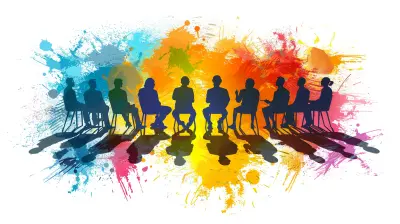The Role of Emotional Regulation in Addiction Recovery
3 June 2025
Addiction recovery can feel like climbing a mountain without a map. It's a journey marked by highs, lows, twists, and unexpected turns. But there’s one key aspect that often goes unnoticed in this complex journey – emotional regulation.
Understanding how emotional regulation plays a pivotal role in managing addiction is not only critical for those in recovery, but it can also be the missing piece of the puzzle that turns setbacks into success. In this post, we will dive deep into the connection between emotional regulation and addiction recovery, unraveling how managing emotions effectively can act as a powerful tool for long-term recovery.

What Is Emotional Regulation?
Before we get too far ahead, let’s break down the term emotional regulation.Simply put, emotional regulation is our ability to manage and respond to emotional experiences in a healthy, constructive way. We all experience emotions – whether it's happiness, anger, sadness, or fear. Emotional regulation is about how we handle these feelings. Do we explode when we’re angry, or take a deep breath and respond calmly? Do we shut down when we’re sad, or express those feelings with someone we trust?
Some people are naturally good at regulating emotions, while others struggle, especially when faced with challenging situations. And when it comes to addiction – a condition intricately tied to emotional states – poor emotional regulation can be both a symptom and an underlying cause.
Why Does Emotional Regulation Matter in Addiction?
Here’s the thing: addiction isn’t just about the physical dependence on a substance or behavior, but also the feelings that come along with it. Many people turn to drugs, alcohol, or other addictive behaviors as a way to escape from painful emotions. Those feelings of stress, guilt, anxiety, or sadness can feel overwhelming, and addiction offers temporary relief – a brief escape from emotional turmoil.However, that escape is short-lived. Eventually, the substances themselves start creating more emotional chaos, leading to a vicious cycle. The inability to regulate emotions turns into a push-pull between feeling out of control and seeking some form of relief.
So, emotional regulation is critical because it offers a healthier alternative. Instead of turning to substances or destructive behaviors when emotions run high, learning how to manage those emotions gives individuals in recovery the tools they need to handle real-life challenges without falling back into old habits.

The Connection Between Emotions and Cravings
Let’s get something straight: cravings aren’t just physical urges. In fact, they’re often tied to emotional states. Think about it – how many times have people reached for a drink after a stressful day or found themselves binge-watching TV to distract from sadness?Research shows that emotions like stress, loneliness, and frustration can trigger cravings for substances or addictive behaviors. In recovery, those moments become crucial “decision points” where emotional regulation can make all the difference. If you can ride out the emotional wave without turning to old habits, you've just taken control of the moment.
The Emotional Rollercoaster of Early Recovery
Early recovery is often described as an emotional rollercoaster – and that’s not far off from the truth. The initial stages of recovery are marked by emotional vulnerability. Without the numbing effect of substances, individuals are suddenly left exposed to emotions they’ve been avoiding for months or even years. And that can be overwhelming.During this period, learning how to regulate emotions becomes super important. Imagine facing waves of sadness, anger, or anxiety head-on – without the crutch of substances. Without emotional regulation skills, it's easy to understand why relapse can happen. But with practice and tools, individuals can better handle these emotional waves, giving them more power to stay on course.

Common Emotional Triggers for Relapse
While relapse can be triggered by many factors, emotional triggers are some of the most common and challenging to manage. Let’s explore some of the biggest emotional culprits:1. Stress
Stress is enemy number one. Whether it’s work-related stress, financial problems, or relationship conflicts, stress can drive people to seek relief in substances. Stress triggers the fight-or-flight response, making us seek out any form of comfort. Without good emotional regulation skills, that comfort often comes in the form of harmful behaviors.2. Loneliness
Humans are social creatures, and isolation or loneliness can make us turn inward. That inward spiral sometimes leads to numbing behaviors, such as drinking or drug use. Emotional regulation helps individuals recognize loneliness for what it is – a temporary state, not a reflection of their self-worth.3. Anger and Resentment
Anger is a powerful emotion, and without the ability to manage it, it can consume someone. Many people in recovery have unresolved anger, often stemming from past relationships, trauma, or feelings of injustice. If left unchecked, anger can feed addiction.4. Sadness and Grief
Recovery involves a lot of letting go – whether it’s saying goodbye to old social circles, habits, or even the person you used to be. It’s natural to grieve those losses, but without emotional regulation, sadness can turn into depression, pulling someone back into the arms of their addiction.5. Guilt and Shame
Addiction has a way of generating mountains of guilt and shame. These feelings can linger even after someone starts their recovery journey. Emotional regulation helps individuals confront these emotions rather than bury them, reducing the chances of relapse.
Emotional Regulation Strategies in Addiction Recovery
So, how exactly can someone in recovery manage those overwhelming emotions? Thankfully, there are tangible strategies that help individuals hone their emotional regulation skills:1. Mindfulness Practices
Mindfulness is all about being present in the moment – without judgment. By practicing mindfulness, individuals can become more aware of their emotions as they arise, instead of being swept away by them. Just pausing to recognize, “I’m feeling anxious right now,” can help create some emotional distance, making it easier to navigate the situation without reacting impulsively.Mindfulness techniques can include deep breathing exercises, meditation, or simply taking time to notice how your body feels when emotions bubble up.
2. Cognitive Behavioral Therapy (CBT)
CBT is a therapeutic approach that helps individuals recognize and change negative thought patterns. In terms of emotional regulation, CBT teaches people how to reframe their emotional responses. For instance, instead of thinking, "I’m never going to succeed, I should just give up," CBT helps challenge that thought with something like, "This is hard, but I’ve faced tough situations before and made it through."CBT equips individuals with the tools to navigate their emotional landscape more effectively, which is a game-changer in recovery.
3. Journaling
Sometimes, emotions can feel tangled and overwhelming. Journaling provides a personal space to untangle those feelings by getting them down on paper. The act of writing helps people process their thoughts and emotions in a more structured way, bringing clarity to what might otherwise feel like chaos.The cool part? Journaling also serves as a reference guide to track progress. You can look back and see how far you've come in managing your emotions.
4. Physical Activity
Emotions are not just mental phenomena – they’re physical, too. Stress and anxiety, for example, trigger physical responses like a racing heart or tense muscles. Physical activity, whether it’s yoga, running, or even just going for a walk, helps release this built-up tension.Exercise floods the brain with feel-good chemicals like endorphins, helping to regulate mood and reduce emotional volatility.
5. Support Systems
Emotional regulation doesn’t happen in a vacuum. Strong support systems – whether it’s friends, family, or fellow recovery group members – play a crucial role. Sometimes, emotional regulation is as simple as being able to vent or talk through what you're feeling.Having people who listen, understand, and offer constructive feedback helps build resilience and keeps people grounded when emotions are running high.
Building Emotional Resilience Over Time
The good news? Emotional regulation is a skill — and like any skill, it improves with practice. Over time, individuals in recovery become more adept at noticing their emotions, managing their responses, and navigating the complexities of life without relying on substances.Emotional resilience, the ability to bounce back from challenges, grows stronger with each successful moment of emotional regulation. It’s like building a muscle. With every emotionally charged situation that someone handles in a healthier way, they’re building their resilience “muscle,” better preparing them for future challenges.
Conclusion
Emotional regulation is a critical component of addiction recovery that doesn’t always get the attention it deserves. While stopping the physical addiction is the first crucial step, learning how to manage emotions is what sustains long-term recovery. By mastering the art of emotional regulation through mindfulness, therapy, and support, individuals in recovery can face life’s challenges head-on, equipped with the tools they need to stay clean and thrive.Because at the end of the day, it’s not about avoiding emotions – it’s about owning them. And when you can own your emotions, you can own your recovery.
all images in this post were generated using AI tools
Category:
AddictionAuthor:

Jenna Richardson
Discussion
rate this article
3 comments
Reina Wheeler
This article highlights a crucial aspect of recovery. Understanding and practicing emotional regulation can empower individuals to navigate their feelings, fostering resilience and promoting healthier coping mechanisms. Thank you for shedding light on this essential journey.
June 12, 2025 at 2:35 AM

Jenna Richardson
Thank you for your thoughtful comment! I'm glad you found the article helpful in highlighting the importance of emotional regulation in recovery.
Ivy Fields
Emotional regulation is vital in addiction recovery; it empowers individuals to manage feelings, reduces impulsivity, and fosters resilience, ultimately paving the way for healthier coping mechanisms and lasting change.
June 5, 2025 at 3:32 PM

Jenna Richardson
Thank you for your insightful comment! I completely agree—emotional regulation is indeed a cornerstone of effective addiction recovery, enabling individuals to develop healthier coping strategies and achieve lasting change.
Edward Maddox
This article highlights the crucial link between emotional regulation and addiction recovery, emphasizing that developing coping strategies can significantly enhance resilience and support lasting change. A must-read for those on the journey!
June 4, 2025 at 4:04 AM

Jenna Richardson
Thank you for your insightful comment! I'm glad you found the article valuable for understanding the importance of emotional regulation in addiction recovery.



